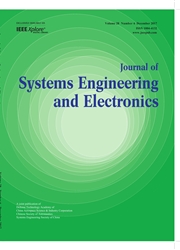

 中文摘要:
中文摘要:
Relative navigation is a key feature in the joint tactical information distribution system(JTIDS).A parametric message passing algorithm based on factor graph is proposed to perform relative navigation in JTIDS.First of all,the joint posterior distribution of all the terminals’ positions is represented by factor graph.Because of the nonlinearity between the positions and time-of-arrival(TOA) measurement,messages cannot be obtained in closed forms by directly using the sum-product algorithm on factor graph.To this end,the Euclidean norm is approximated by Taylor expansion.Then,all the messages on the factor graph can be derived in Gaussian forms,which enables the terminals to transmit means and covariances.Finally,the impact of major error sources on the navigation performance are evaluated by Monte Carlo simulations,e.g.,range measurement noise,priors of position uncertainty and velocity noise.Results show that the proposed algorithm outperforms the extended Kalman filter and cooperative extended Kalman filter in both static and mobile scenarios of the JTIDS.
 英文摘要:
英文摘要:
Relative navigation is a key feature in the joint tactical information distribution system(JTIDS).A parametric message passing algorithm based on factor graph is proposed to perform relative navigation in JTIDS.First of all,the joint posterior distribution of all the terminals' positions is represented by factor graph.Because of the nonlinearity between the positions and time-of-arrival(TOA) measurement,messages cannot be obtained in closed forms by directly using the sum-product algorithm on factor graph.To this end,the Euclidean norm is approximated by Taylor expansion.Then,all the messages on the factor graph can be derived in Gaussian forms,which enables the terminals to transmit means and covariances.Finally,the impact of major error sources on the navigation performance are evaluated by Monte Carlo simulations,e.g.,range measurement noise,priors of position uncertainty and velocity noise.Results show that the proposed algorithm outperforms the extended Kalman filter and cooperative extended Kalman filter in both static and mobile scenarios of the JTIDS.
 同期刊论文项目
同期刊论文项目
 同项目期刊论文
同项目期刊论文
 Joint Channel Estimation and Decoding in the Presence of Phase Noise over Time-selective Flat-fading
Joint Channel Estimation and Decoding in the Presence of Phase Noise over Time-selective Flat-fading Semi-analytical method for performance analysis of code-aided soft-information based iterative carri
Semi-analytical method for performance analysis of code-aided soft-information based iterative carri Factor-graph-based iterative channel estimation and signal detection algorithm over time-varying fre
Factor-graph-based iterative channel estimation and signal detection algorithm over time-varying fre Expectation-maximisation-based localisation using anchors with uncertainties in wireless sensor netw
Expectation-maximisation-based localisation using anchors with uncertainties in wireless sensor netw Distributed cooperative localization based on gaussian message passing on factor graph in wireless n
Distributed cooperative localization based on gaussian message passing on factor graph in wireless n 期刊信息
期刊信息
